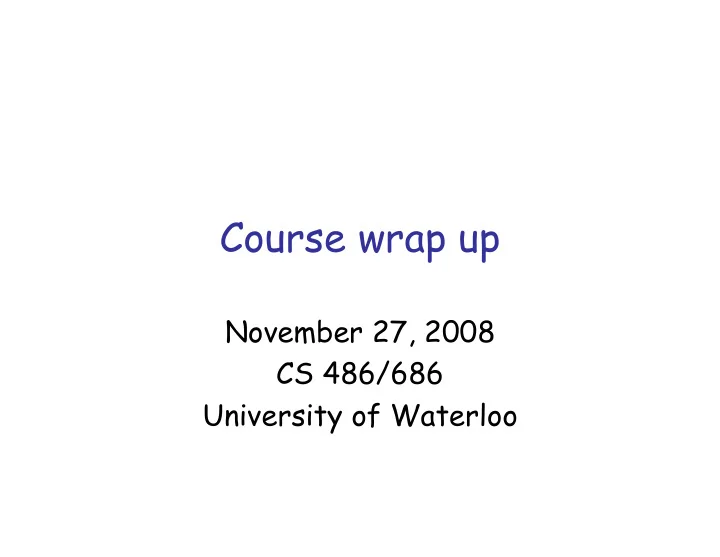

Course wrap up November 27, 2008 CS 486/686 University of Waterloo
Outline • Course wrap up • Final exam info • Other AI courses • AI jobs • AI research 2 CS486/686 Lecture Slides (c) 2008 P. Poupart
Topics Covered • Knowledge representation • Search algorithms • Probabilistic Inference • Decision Making under Uncertainty • Machine Learning 3 CS486/686 Lecture Slides (c) 2008 P. Poupart
Topics That We Didn’t Cover • Computer Vision • Natural Language Processing • Robotics • Reinforcement Learning • Multi-agent Systems 4 CS486/686 Lecture Slides (c) 2008 P. Poupart
Agents and Environments sensors percepts environment ? agent actions actuators Agents include humans, robots, softbots, thermostats… The agent function maps percepts to actions f:P* � A The agent program runs on the physical architecture to produce f 5 CS486/686 Lecture Slides (c) 2008 P. Poupart
Rational Agents • Recall: A rational agent “does the right thing” • Performance measure – success criteria – Evaluates a sequence of environment states • A rational agent chooses whichever action maximizes the expected value of its performance measure given the percept sequence to date – Need to know performance measure, environment, possible actions, percept sequence • Rationality ≠ Omniscience, Perfection, Success • Rationality � exploration, learning, autonomy 6 CS486/686 Lecture Slides (c) 2008 P. Poupart
Bounded Rationality • What if the best strategy given past percepts cannot be implemented with today’s computers? • We have seen many theories for rational agents but what if those theories are intractable? • Bounded rationality: find best implementable strategy given past percepts 7 CS486/686 Lecture Slides (c) 2008 P. Poupart
Other AI courses • CS489/689: Theoretical Foundations of Machine Learning • CS785: Intelligent Computer Interfaces • CS786: Probabilistic Inference and Machine Learning • CS798: Logic in Computer Science • CS886: Bayesian Data Analysis • CS886: Human Language Technologies • STAT440/840: Computational Inference • STAT441/841: Statistical Learning – Classification • STAT442/890 Data visualization 8 CS486/686 Lecture Slides (c) 2008 P. Poupart
CS489/689: Theoretical Foundations of Machine Learning • Instructor: Shai Ben David • Term: Spring 2009 • Objectives: – The course is aimed to familiarize the students with the basic theoretical tools and issues underlying some of the most useful machine learning techniques. The theory of machine learning draws from several established mathematical areas including statistics, geometry, combinatorics, and computational complexity. 9 CS486/686 Lecture Slides (c) 2008 P. Poupart
CS785 Intelligent Computer Interfaces • Instructor: Robin Cohen • Term: Fall 2009 • Topics: Natural language processing, plan recognition, user modeling, dialogue, multi- agent systems, case based reasoning, intelligent information retrieval, data mining, intelligent tutoring systems, etc. 10 CS486/686 Lecture Slides (c) 2008 P. Poupart
CS786: Probabilistic Inference and Machine Learning • Instructor: Pascal Poupart • Term: ??? (Winter 2010) Objectives: This course will focus on the principles of • probabilistic reasoning and sequential decision making for a wide range of settings including adaptive and multi-agent systems. The modeling techniques that will be covered are quite versatile and can be used to tackle a wide range of problems in many fields including robotics (e.g., mobile robot navigation, control), computer systems (e.g., autonomic computing, query optimization), human-computer interaction (e.g., spoken dialog systems, user modeling), bioinformatics (e.g., gene sequencing, design of experiments), operations research (e.g., resource allocation, maintenance scheduling, planning), etc. Hence, the course should be of interest to a wide audience beyond artificial intelligence. 11 CS486/686 Lecture Slides (c) 2008 P. Poupart
CS798: Logic in Computer Science • Instructor: Shai Ben David • Term: Spring 2009 – Covers topics that are not in CS245 • Completeness and compactness of first-order logic • Godel’s incompleteness theorems • Applications in data bases and formal verification 12 CS486/686 Lecture Slides (c) 2008 P. Poupart
CS886: Bayesian Data Analysis • Instructor: Pascal Poupart • Term: Winter 2009 • Topics: – Bayesian learning – Gaussian processes – Dirichlet processes – Hierarchical priors 13 CS486/686 Lecture Slides (c) 2008 P. Poupart
CS886: Human Language Technologies • Instructor: Chrysanne DiMarco • Term: Fall 2009 • Topics: TBA – Mostly computational linguistics 14 CS486/686 Lecture Slides (c) 2008 P. Poupart
Courses in Statistics • Instructor: Ali Ghodsi – www.math.uwaterloo.ca/~aghodsib/teaching.html • Courses – STAT440/840: Computational Inference – STAT441/841: Statistical Learning – Classification – STAT442/890 Data visualization 15 CS486/686 Lecture Slides (c) 2008 P. Poupart
AI research group • Web: ai.uwaterloo.ca • Professors: – Shai Ben David (learning theory) – Chrysanne DiMarco (natural language processing) – Peter Van Beek (constraint programming) – Robin Cohen (multi-agent systems, user modeling) – Pascal Poupart (reasoning under uncertainty, machine learning, natural language processing) – Kate Larson (game theory, mechanism design) – Richard Mann (computational vision) 16 CS486/686 Lecture Slides (c) 2008 P. Poupart
My research projects • Decision Making under uncertainty – Partially observable Markov decision processes – Bayesian reinforcement learning • Intelligent assistive technologies – Smart walkers – Symptom monitoring for Alzheimer’s disease • Natural language processing – Document clustering – Spoken dialogue systems • Machine learning – Semi-supervised learning – Cluster Labeling 17 CS486/686 Lecture Slides (c) 2008 P. Poupart
AI jobs • Very few “AI companies” • AI tends to be embedded in many applications • Many companies have AI R&D groups – Intel, Microsoft, IBM, Google, NEC, Yahoo, HP • AI is a growing industry • Has the potential to revolutionize the computer industry! 18 CS486/686 Lecture Slides (c) 2008 P. Poupart
Recommend
More recommend